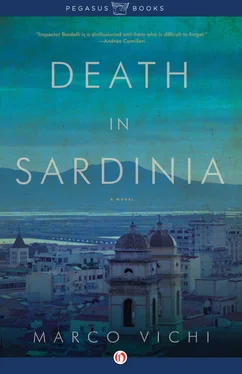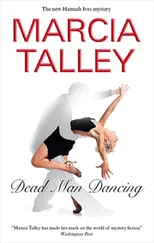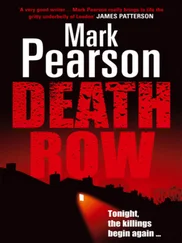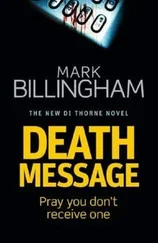Marco Vichi - Death in Sardinia
Здесь есть возможность читать онлайн «Marco Vichi - Death in Sardinia» весь текст электронной книги совершенно бесплатно (целиком полную версию без сокращений). В некоторых случаях можно слушать аудио, скачать через торрент в формате fb2 и присутствует краткое содержание. Год выпуска: 2014, ISBN: 2014, Издательство: Pegasus Books, Жанр: Полицейский детектив, на английском языке. Описание произведения, (предисловие) а так же отзывы посетителей доступны на портале библиотеки ЛибКат.
- Название:Death in Sardinia
- Автор:
- Издательство:Pegasus Books
- Жанр:
- Год:2014
- ISBN:978-1-4804-4794-3
- Рейтинг книги:5 / 5. Голосов: 1
-
Избранное:Добавить в избранное
- Отзывы:
-
Ваша оценка:
- 100
- 1
- 2
- 3
- 4
- 5
Death in Sardinia: краткое содержание, описание и аннотация
Предлагаем к чтению аннотацию, описание, краткое содержание или предисловие (зависит от того, что написал сам автор книги «Death in Sardinia»). Если вы не нашли необходимую информацию о книге — напишите в комментариях, мы постараемся отыскать её.
Death in Sardinia — читать онлайн бесплатно полную книгу (весь текст) целиком
Ниже представлен текст книги, разбитый по страницам. Система сохранения места последней прочитанной страницы, позволяет с удобством читать онлайн бесплатно книгу «Death in Sardinia», без необходимости каждый раз заново искать на чём Вы остановились. Поставьте закладку, и сможете в любой момент перейти на страницу, на которой закончили чтение.
Интервал:
Закладка:
‘What are you doing for Christmas, Toto? Going down to see your folks?’ the inspector asked, to change the subject. The cook paused for a moment, then approached, wiping his hands on his apron.
‘This year they’re coming up here. Cesare has decided to keep the restaurant open over the holidays. And what are you doing?’
‘I don’t know yet.’
‘Why don’t you come and spend Christmas with us, Inspector? There’s more than fifty of us, and we make enough noise to wake the dead. And you really ought to see some of my lovely cousins …’ he said suggestively, drawing the shape of a woman’s curves in the air with his hands.
‘Thanks, Toto, I’ll keep it in mind,’ said Bordelli, cautiously continuing his journey through the Algerian fire. He didn’t really feel like thinking about women at the moment. His last affair, which had ended badly, still weighed heavy on his mind. Milena, a twenty-five-year-old Jewish girl, had left a wound inside him that hadn’t yet healed. To chase the thought from his head, he put another piece of that devilish osso buco in his mouth.
Pietrino Piras came home from a difficult walk on crutches. The doctor had told him that the more he moved, the more quickly he would heal, and he couldn’t wait to get back to Florence. He didn’t like sitting around twiddling his thumbs.
And Florence meant being with Sonia. He was dying to see her. At the moment she was in Palermo with her family and would spend the entire holiday with them. They talked over the telephone three or four times a week, and his mother kept trying to find out who this girl was who called so often asking for her Nino. He pretended it was nothing and wouldn’t even tell her the girl’s name. He was always jealously guarded about his things, and especially about Sonia.
It was lunchtime. In one corner of the kitchen stood a small Christmas tree adorned with the same baubles of coloured glass he’d known since childhood. His mother had decorated it that morning, much later than in years gone by. A fire had been burning in the hearth since the morning. Pietrino sat down at the table with his father, and Mamma arrived with a serving bowl of spaghetti in tomato sauce.
‘Zia Bona dropped by,’ she said, filling their plates.
‘She’s going to get the spumante for Christmas dinner.’
‘Mamma, this is enough pasta for four …’
‘Eat, Nino, the doctor said you must eat.’
‘It’s too much.’
‘It’s not, you’ll see.’
‘If you force him he won’t eat any meat afterwards,’ Gavino said to his wife.
His parents coddled him like a child. They were happy to have him at home, even if it was because of that frightful incident. Piras’s mother, Maria, was a small woman but full of energy. She worked like a slave and never let up. She spoke in Sardinian dialect, but had gone to school up to the third grade and knew Italian fairly well. She always wore a headscarf tied under her chin and had dramatic eyes. She took care of the animals. She and Gavino had a few chickens, a lot of rabbits and two pigs.
‘Gigi and Pino won’t be coming this Christmas, either,’ said
Maria. They were the two other sons, both older than Pietrino.
They were married and had been living in France for many years.
‘We’ve known that since October. Why repeat it?’ Gavino said.
‘Well, they could have come,’ Maria said.
‘They’ll come next year,’ said Gavino, pretending it didn’t bother him.
‘I understand them, Mamma, it’s too expensive.’
‘Not even for Christmas …’ said Maria, staring at her plate.
They carried on eating in silence. There was only the sound of fire consuming wood.
Gavino kept himself busy working his small plot of land.
He’d lost an arm in combat in ’45, while fighting at Bordelli’s side. But he worked as if he had three arms instead of one. He dug holes, pruned trees, harvested tomatoes. He was very proud of his plot of land and wanted to do all the work himself for as long as he could. Every morning at dawn a friend would come by in a little Fiat 600 van, buy a bit of everything, and sell it at the market in Oristano.
Pietrino realised he was hungrier than he thought and finished all the spaghetti on his plate. His mother smiled with satisfaction when she took the empty dish away. Mothers are always right. The wine was tart and light and still smelled of grapes. Gavino made it himself, repeating each year everything he’d seen his grandfather and father do.
Maria brought two frying pans to the table. Polenta with cavolo nero 5and pezz’imbinata , little strips of pork marinated in red wine and then grilled. Pietrino knew those flavours well. They were as much a part of his life as the walls of the house or the small picture of Santa Bonacatu hanging over the fireplace.
‘I made this cabbage with my own hands,’ Gavino said, dipping his spoon into the polenta.
‘You have only one hand, Gavino, and only God can make living things,’ said Maria, ribbing him. Her husband ignored her and looked at his son.
‘Eat. Taste that? It’s good because there’s hard work in it,’ he said, squeezing Pietrino’s arm.
‘You say that every day, Dad,’ said Nino, smiling.
‘And you eat every day,’ said Gavino, entirely serious.
Pietrino continued eating in silence. After lunch he went and rested in the armchair next to the fireplace and in front of the television, a fine twenty-one-inch Sylvania on the plastic stand he’d given to his parents for their last anniversary. Maria didn’t like having the antenna on the rooftop. That metal contraption would attract lightning, she said. The Piras family owned one of the few television sets in town, and often friends and relatives would come by to watch a programme or two, especially on Saturday nights and Sundays.
As his mother was washing the dishes, Pietrino distractedly watched the end of a programme on natural science, and then the test card came up. He leaned forward and, without getting up, extended a crutch and turned the set off with the tip. He tried to read a few lines of Simenon, but his full stomach and the warmth of the fire put him to sleep.
He woke up around three o’clock and sat there in a daze, staring at the lifeless television. He yawned, feeling tired from so much leisure.
Gavino was doubtless already out in the field, while his mother had gone to see to her bees. Sometimes Piras would go with her, but he never got close to the hives. He was always amazed to see hundreds of bees land on his mother’s arms and face without ever stinging her.
Reaching down, he picked up the Simenon novel again. He’d brought a whole suitcase full of books with him from Florence, lent to him by Simone, a close friend of Sonia’s who he was a little jealous of at first. Partly because he lived right across the landing from her, but mostly because he was very good looking.
Piras was only a few pages from the end of the novel. He read them in a few minutes, then closed the book and tapped it with his hand. He always did that when finishing a novel he liked.
Feeling a little groggy, he stretched and some of his joints cracked. To avoid falling back to sleep, he stood up, leaned on his crutches, and went out into the street. Staying indoors too long made him restless. There was never anything for him to do besides reading, and in his present condition he couldn’t even give his parents a hand in the field or in the stables. He would have been glad to do so, if only to help the time go by faster.
The inspector left Toto’s kitchen feeling as if he wanted to sleep. When all was said and done, he realised he had drunk nearly a whole bottle of wine by himself. The avenue was full of Christmas traffic. He headed towards Via Zara, repressing the urge to light another cigarette. It wasn’t raining, but the sky had turned into a slab of lead, and he could feel the humidity in his bones. He preferred snow, but it hardly ever snowed in Florence. He’d once slept in snow, on a night in Umbria in 1944, and it was one of the few times sleeping out in the open when he hadn’t felt cold.
Читать дальшеИнтервал:
Закладка:
Похожие книги на «Death in Sardinia»
Представляем Вашему вниманию похожие книги на «Death in Sardinia» списком для выбора. Мы отобрали схожую по названию и смыслу литературу в надежде предоставить читателям больше вариантов отыскать новые, интересные, ещё непрочитанные произведения.
Обсуждение, отзывы о книге «Death in Sardinia» и просто собственные мнения читателей. Оставьте ваши комментарии, напишите, что Вы думаете о произведении, его смысле или главных героях. Укажите что конкретно понравилось, а что нет, и почему Вы так считаете.










